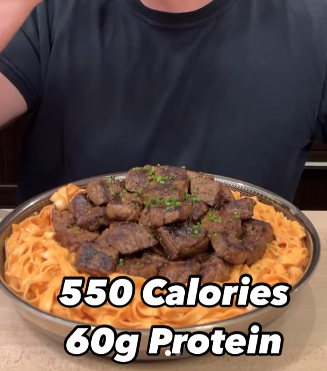Would you believe me if I told you how you could make a tasty, cheesy, low-calorie pasta that has over 80 grams of protein? Well, you shouldn’t. That’s because some meals shared on Tik-Tok and Instagram are less about helping people and more about getting attention.
While some influencers provide valuable and accurate advice, others share misleading or downright inaccurate information, particularly when it comes to nutrition. This can have serious consequences for those who rely on their guidance. Let’s delve into the reasons behind this.
The Allure of Social Media Influence
Social media influencers often gain their following by portraying an idealized version of health and fitness. Their posts are visually appealing, showcasing picture-perfect meals, toned bodies, and seemingly effortless lifestyles. However, the reality behind these posts is often far from the truth.
Financial Incentives
Influencers have strong financial incentives to share content that garners high engagement. The more likes, shares, and comments a post receives, the more valuable the influencer becomes to brands and advertisers. This can lead influencers to:
- Promote Extreme Diets: Sensationalized content, such as extreme diets or “miracle” weight loss plans, attracts attention and drives engagement. For instance, a post about a drastic 1,000-calorie-per-day meal plan can go viral because it promises quick results, even if it’s unsustainable and unhealthy.
- Endorse Questionable Products: Many influencers receive payments to promote specific diet products or supplements. These endorsements often lack scientific backing and can mislead followers into thinking these products are effective and necessary for weight loss or health. Though there are some (ahem) light regulations on what makes an #ad, the distinction is often blurred.
Lack of Accountability
One major issue with the nutrition advice shared by influencers is the lack of legal accountability. Unlike registered dietitians or nutritionists who are bound by professional standards and regulations, influencers can share virtually any advice without facing legal repercussions. This creates a landscape where misinformation can spread unchecked. Some terms like “nurse practitioner” and “therapist” are legal distinctions, whereas literally anyone can style themself a “health coach” or “specialist.”
Misleading Meal Plans
To understand the potential harm of following influencer-promoted meal plans, let’s look at a few examples:
Example 1: The “Detox” Diet
A popular influencer might share a “detox” diet plan that includes:
- Breakfast: A green smoothie (spinach, kale, apple, and almond milk)
- Lunch: A small salad with mixed greens, cherry tomatoes, cucumber, and lemon dressing
- Dinner: A bowl of vegetable soup
This plan appears healthy at first glance but likely underestimates calorie needs. For an average adult, this diet might provide around 800-1,000 calories per day, far below the recommended intake. Following such a plan can lead to nutrient deficiencies, decreased energy levels, and a slowed metabolism.
Example 2: The “Skinny Tea” Regimen
Another common post might feature a “skinny tea” regimen where the influencer claims to drink only specific branded teas for meals. These teas are often marketed as fat burners or appetite suppressants but lack substantial scientific evidence to support such claims. The real danger lies in the promotion of extremely low-calorie intake masked as a healthy lifestyle choice.
The Impact of Misinformation
The spread of misleading nutrition advice can have severe consequences:
- Nutrient Deficiencies: Extreme diets often lack essential nutrients, leading to deficiencies that can cause long-term health problems.
- Eating Disorders: Unrealistic diet plans can contribute to unhealthy relationships with food, fostering eating disorders such as anorexia or bulimia.
- Weight Cycling: Following unsustainable diets can result in the yo-yo effect, where individuals lose and regain weight repeatedly, harming metabolic health.
The Role of Shocking Content
Influencers often resort to sharing shocking or sensational content to boost engagement. This can include:
- Drastic Before-and-After Photos: These photos are often edited or staged to exaggerate results, creating unrealistic expectations.
- Unverified Health Claims: Claims such as “lose 10 pounds in a week” or “detox your body with this drink” are common and rarely backed by scientific evidence.
- Misleading Calorie (or Protein) Tracking: Posts like the picture above are at best misleading. It’s presenting “meal prep” for 2 meals, but presented as 1 dish– i.e. 550 calories written with the visuals of 2,200 calories. On top of this, the math for calorie count doesn’t add up, nor does the meal seem well-balanced.
Conclusion
While social media can be a valuable source of inspiration and motivation, it’s crucial to approach nutrition advice from influencers with a critical eye. Understanding the financial incentives and lack of accountability that drive these influencers can help you make more informed choices about your health.
For personalized and scientifically-backed nutrition, health, and wellness advice, consider consulting with professionals who are trained and qualified to provide reliable guidance. If you’re looking for tailored support (clinical or otherwise), book a session with The A-List Clinic today and take the first step towards a healthier, more informed lifestyle.
